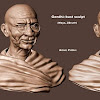
At the beginning of the 20th Century, after Gandhiji had appeared on the national scene, the politics of reasoned debate was replaced by the politics of mass demand. At a time when society was predominantly illiterate, how did political ideas spread? That too when there was oppressive censorship of the media? It is in this context that popular drama, songs and gramophone records and films became carriers of political ideas. It is during this period that interaction between politics and the entertainment media, between cinema and politics, began in the Madras Presidency that was to be whittled down to Madras province and, then, Tamil Nadu.
By the 1920s and 1930s, company dramas had become highly politicised. Most of the plays were nationalistic. M.G.R. acted in nationalistic plays and was a khadi-wearing Congress sympathiser. Sivaji Ganesan, in his pre-Parasakthi days, acted in a number of these patriotic plays.
The British saw cinema as an instrument of political propaganda, a challenge to their rule. But the direct participation of actors in political action continued. K.B. Sundarambal campaigned for Congress in the 1937 elections. M.V. Mani also spoke at election meetings. Later, during the Quit India Movement, a number of film actors took part in direct political action and suffered imprisonment. Nagaiya was a delegate to the Gauhati Congress. K.B. Sundarambal was the first film star to enter the legislature.











No comments:
Post a Comment